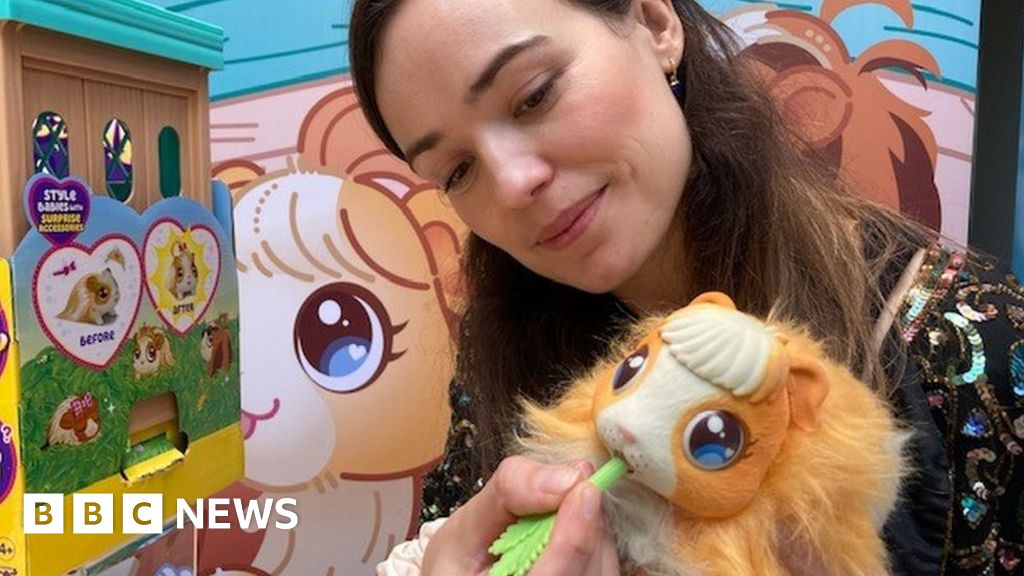Parents Buying More Toys And Games For Themselves

Soft toys, like these made from recycled plastic bottles, were popular
Parents are increasingly buying toys and games for themselves, despite cost-of-living pressures, new research suggests.
Analysts NPD said more than one in four toys and games bought last year went to adults and teenagers.
So-called kidults may be spending their limited disposable income on puzzles rather than nights out, it added.
It came as toy sales overall fell in 2022 as parents cut back on low-cost impulse buys.
The number of toys and games sold fell by 6% compared with the previous year, NPD said.
Parents typically bought toys of £30 to £50, but resisted small and unplanned purchases, with sales of "pocket money toys" under £10 falling sharply.
Christmas is a key period for toy sales
Among the most popular items sold were soft toys such as Squishmallows, building sets, action figures and vehicles.
Melissa Symonds, NPD's executive director, said parents similarly cut back on low cost during the financial crisis of 2008.
She added that parents facing rising bills and prices had become very price savvy, seeking out "choice and value".
About a third of shoppers compared prices online and in-store before deciding what to buy in the run-up to Christmas. Such considered shopping habits were another factor in the drop in lower cost toy sales, she suggested.
In-store sales accounted for half of last year's total, up 6% on the previous year, owing in part to concern over delivery disruption and there being a full shopping week before Christmas Day which fell on a Sunday.
The Lionesses Subbuteo line celebrated the real team's success
Despite consumers shopping around on price, the toy industry is comparatively resilient to economic downturns compared with other sectors.
Sales last year, by value, were down 3% compared with the previous year, NPD analysis suggests.
The average price of a toy is £10.54. With price so important to consumers, the toy industry has been lobbying the government over rules regarding the sale of cheap, potentially low-quality products on internet marketplaces.
The British Toy and Hobby Association, which is holding its annual Toy Fair at London's Olympia, said there was a risk of dangerous products being sold by third-party sellers on these sites.
Spokeswoman Kerri Atherton said that these portals did not have the same obligations as the rest of the industry, allowing third-party sellers to list cheaper products without having to invest in quality and safety controls.
She said the association had been pressing ministers on the matter for four years, but now a product safety review was imminent.
From Chip War To Cloud War: The Next Frontier In Global Tech Competition
The global chip war, characterized by intense competition among nations and corporations for supremacy in semiconductor ... Read more
The High Stakes Of Tech Regulation: Security Risks And Market Dynamics
The influence of tech giants in the global economy continues to grow, raising crucial questions about how to balance sec... Read more
The Tyranny Of Instagram Interiors: Why It's Time To Break Free From Algorithm-Driven Aesthetics
Instagram has become a dominant force in shaping interior design trends, offering a seemingly endless stream of inspirat... Read more
The Data Crunch In AI: Strategies For Sustainability
Exploring solutions to the imminent exhaustion of internet data for AI training.As the artificial intelligence (AI) indu... Read more
Google Abandons Four-Year Effort To Remove Cookies From Chrome Browser
After four years of dedicated effort, Google has decided to abandon its plan to remove third-party cookies from its Chro... Read more
LinkedIn Embraces AI And Gamification To Drive User Engagement And Revenue
In an effort to tackle slowing revenue growth and enhance user engagement, LinkedIn is turning to artificial intelligenc... Read more

